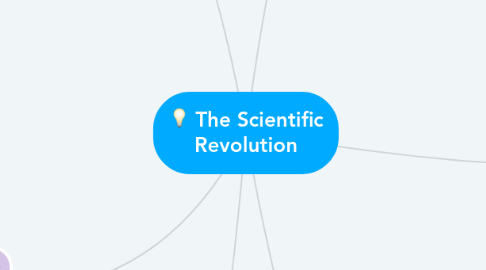
1. Important Dates
1.1. (1550 - 1700)
1.1.1. Nicholas Copernicus publishes Concerning the Revolutions of Celestial Spheres (1543)
1.1.2. Brahe publishes Nova (1572)
1.1.3. Newton publishes Principia (1687)
1.1.4. Descartes publishes Discourse on Method (1636)
1.1.5. Galileo condemned by the Catholic Church and put on house arrest (1633)
2. Geographic Locations
2.1. England
2.1.1. (1640 - 1660)
2.1.2. Royal Society of London for Improving Natural Knowledge
2.1.3. Royal Observatory
2.1.4. Philosophical Transactions of the Royal Society
2.1.5. University of Cambridge
2.2. France
2.2.1. (1666) French Royal Academy of Science
2.2.2. Jean-Baptise Colvert
2.2.3. Financed experiments to benefit French economy
2.3. Italy
2.3.1. University of Padua
2.3.1.1. Venice
2.3.1.2. Copernicus and Galileo taught here
3. Ancient and Medieval Science
3.1. Aristotle (384 - 322 B.C)
3.1.1. Greek Philosopher
3.1.2. Believed that Earth was at the center of the Universe
3.1.3. Geocentric Theory
3.2. Clausius Ptolemy (c. 85 - 165 A.D.)
3.2.1. Greek Astronomer
3.2.2. Almagest, quadrant, spherical orbits, 80 spheres
3.3. Dante (1265 - 1325)
3.3.1. Medieval Thinker
3.3.2. Reflected beliefs of Aristotle and Ptolemy
3.3.3. 10 spheres around the Earth
3.3.4. Hell was the center
4. Important People
4.1. Nicholas Copernicus (1473 - 1543)
4.1.1. Challenges Aristotle on Geocentric Theory
4.1.2. Heliocentric Theory
4.1.3. Sun was the center of the universe
4.2. Galen (129 - c. 210)
4.2.1. Used apes for expirement
4.2.2. Four Humors
4.2.2.1. Blood
4.2.2.2. Plegm
4.2.2.3. Yellow bile
4.2.2.4. Black bile
4.3. Andreas Vesalius (1514 - 1564)
4.3.1. Founder of modern biological science
4.3.2. Discovered the 4 chambers of the heart
4.4. William Harvey (1578 - 1657)
4.4.1. Blood Circulation
4.5. Johannes Kepler (1571 - 1630)
4.5.1. HRE, Rudolph III
4.5.2. Three laws of planetary motion
4.6. Galileo Galilei (1564 - 1642)
4.6.1. Telescope
4.6.2. Theory of Inertia
4.6.3. Condemned by Inquisition
4.7. Rene Descartes (1595 - 1656)
4.7.1. "I think therefore I am"
4.7.2. Cartesianism
4.7.2.1. Mind and Matter
4.7.3. God as clockmaker
5. Science and Religion
5.1. Protestant
5.1.1. Civil Law
5.2. Catholic
5.2.1. Cannon law
5.2.2. Index of Forbidden books
5.2.3. Inquisition
6. Art and Society
6.1. Colbert Presenting the Members of Royal Academy of Sciences to Louis XIV
6.1.1. 1667
6.1.2. By Henri Testelin
6.1.3. Link to picture (couldn't add picture on the free trial)
6.2. Women
6.2.1. Margaret Cavendish
6.2.1.1. Dutchess of Newcastle
6.2.1.2. Accepted that women had softer and smaller brains than men
6.2.1.3. Women banned from Royal Society until 1945

